牛津译林版高中英语必修一高一模块一Unit1Schoollife备课资料:课件Welcometotheunit
【英语】牛津译林版高中英语必修一Unit1SchoolLifeword教案
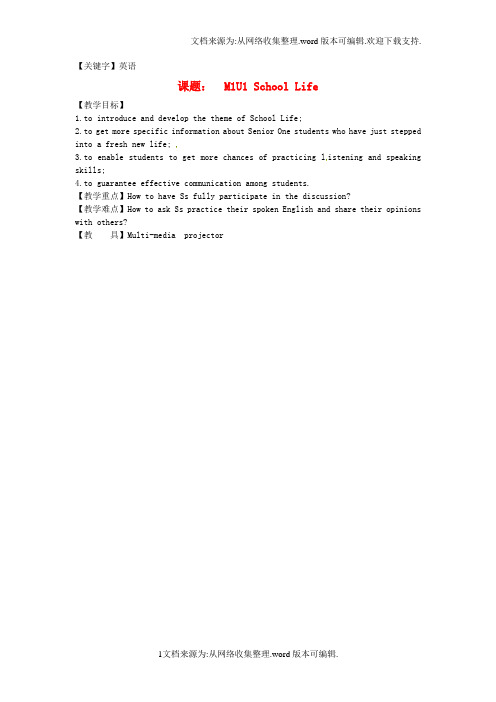
【关键字】英语课题: M1U1 School Life【教学目标】1.to introduce and develop the theme of School Life;2.to get more specific information about Senior One students who have just stepped into a fresh new life;3.to enable students to get more chances of practicing l istening and speaking skills;4.to guarantee effective communication among students.【教学重点】How to have Ss fully participate in the discussion?【教学难点】How to ask Ss practice their spoken English and share their opinions with others?【教具】Multi-media projector【教学过程】【二次备课】Step 1 Greeting and lead-inWelcome to our English class. I’m very glad to see you here.It’s the beginning of a new team you have just finished juniorschool and are about to enter a new period in your studies.In your opinion, what do you think of your school life?School life: excitement, challenges, success, laughter’s,tears, joys, sorrows, dreams, discoveries,failures.Step2welcome to the UnitT: High school is a time of discovery, learning and hard work.You should cherish the time and makeProgress every day. I can see you’re eager to know whatstudying at senior high will be like inChina?Is it different from other countries. Let’s compare them.In the British High SchoolIn the Chinese High School1.huge campus and low-rise buildinglarge campus and tall buidings2.locker for every studentnone has such equipment3. fewer students in each class 40-50-604. at ease with teachersbe friendly to each otherstep3 DiscussionT: Discuss the three questions on page1Can you dream of your school life? ( teacher? Students?Classmates?) what characteristics should theyhave?Teachers: fair, patient, learned, humorous, co-operative,energeticStudents: diligent, e nergetic, civilized, polite,competitive, co-operate, open-minded,strong-mindedT: very good. Teachers and students should cooperate with eachotherTeacher s hould love / learn from/ encourage/ understand/help/ respectT: only in this way. Can we make progress every day and achievesuccess. How can we achieve Success?(courage, belief, luck, diligence, perseverance,intelligence,confidence, competence,cooperation, wisdom, determination)T: like a scientist bent on making a discovery, we must cherishthe hope that one day we will rewarded.Some useful saying1.Life is a bumpy road.2.where there is a will, there is a way.3.Failure is the mother of success.Step4 Language points1.High school is a time of discovery, learning and hard work.抽象名词time, means, knowledge, collection, 在具体语境中,即后面有of短语或后接一个定语从句,前面要加不定冠词a/anThere was on ce a time when I hated to go to school.have a good knowledge of English 精通英语have a large collection of coins2.What are some differences between……?参考金榜直通P2补充:tell the difference between A and B= tell A from B 3.What is your dream school like?What is sth like? 某物是什么样的?What is sb like? 某人的(性格、外貌....)是什么样的?What does sb/ sth look like?某人(某物)看起来是什么样的?How is sth?某物的质量如何?How is sb?某人的身体怎样?补充:你觉得…..怎么样?How do you like/find ……?What do you think of ……?What do you like about ……?发散:like doing/ to do 喜欢做....Would ike to do 愿意做....feel like doing 想做.....Sound like 听起来像......【作业布置】【教学后记】此文档是由网络收集并进行重新排版整理.word可编辑版本!。
新牛津译林版必修一unit1《school life》优秀教案7(重点资料).doc
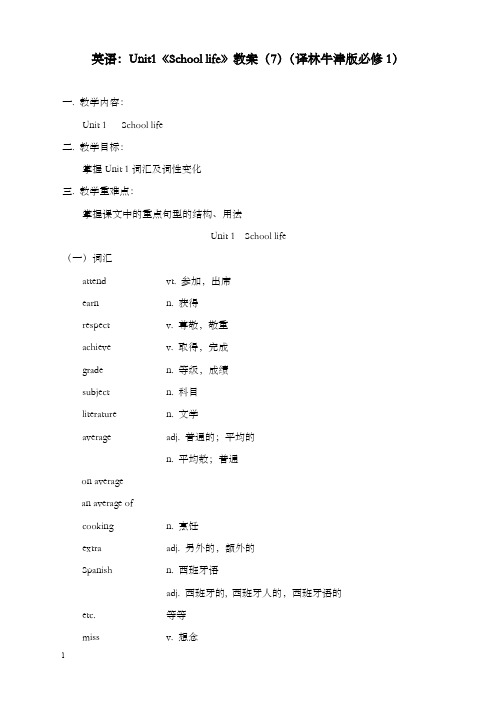
英语:Unit1《School life》教案(7)(译林牛津版必修1)一. 教学内容:Unit 1 School life二. 教学目标:掌握Unit 1词汇及词性变化三. 教学重难点:掌握课文中的重点句型的结构、用法Unit 1 School life(一)词汇attend vt. 参加,出席earn n. 获得respect v. 尊敬,敬重achieve v. 取得,完成grade n. 等级,成绩subject n. 科目literature n. 文学average adj. 普通的;平均的n. 平均数;普通on averagean average ofcooking n. 烹饪extra adj. 另外的,额外的Spanish n. 西班牙语adj. 西班牙的, 西班牙人的,西班牙语的etc. 等等miss v. 想念dessert n. 餐后甜点dessert , desert /e/dessert表示甜点,而desert 表示沙漠。
但是desert也可以发/ i /, 这时它是作为动词,意思是抛弃,离弃。
例:荒岛a deserted islandexperience vt. 经历,体验辨析experience和experimentexperience 表示经验,经历,而experiment表示实验。
注意两个单词拼法上的区别。
article vt. 文章immediately vi 立刻,马上(二)课文重难点1. meanv. 意味What do you mean?1)mean that +宾语从句我是说你不需要今天就完成。
I mean you needn’t finish it today.2)mean doingFalling into the river on such a cold day means losing your life.学好英语意味着花大量的时间。
Learning English means spending a lot time.3)mean to do 计划=plan to doI didn’t mean to hurt you.我们本打算给你一个惊喜的。
Unit1SchoolLife(译林牛津版高一英语必修一教案教学设计)

Unit1SchoolLife(译林牛津版高一英语必修一教案教学设计)Textual Analysis:This unit introduces and develops the theme of school life.(1) In Welcome to the unit, students are presented with four different aspects of school life in the UK and are asked to compare the differences between high schools in the UK and in China. The reading text School life in the UK deals with an article from a school magazine on school life in the UK.(2) Word power talks about school facilities;(3) In grammar and usage, students are required to learn the Attributive Clause--- the usages of “that, which, who, whose, whom”.(4) Task deals with reporting school activities. In the Project section, students will learn how to design a poster.Teaching aims:Encourage the Ss to learn the following(1) Vocabulary: words and phrases(2) Grammar: the Attributive Clause--- the usages of “that, which, who, whose, whom”(3) Skills of reading a magazine(4) Culture: school life; school activities; after-school activities; schoolclubsImportant points & difficult points:The Attributive Clause; Making a projectTeaching aids:computer; tape-recorderInteractive patterns:teacher-class; pairs; groupsTeaching methods:Audio-visual method; Direct method; Functional approach Teaching process:Welcome to the Unit: (0.5 period)(1) Warming up questions(2) Talk about the pictures(3) More questionsReading: (1.5 periods)(1) Lead-in(2) First reading(3) Further reading(4) Text Check(5) Notes/language points(6) ExercisesGrammar (task-teaching method) (2 periods)(1) explanation(2) exercisesWord power (1.5 periods)(1) text learning(2) more exercisesProject (1.5periods)(1) text learning(2) more practiceSelf-assessment (1 period)/Test (1 period)Periods:Welcome to the Unit: (0.5 period)(1) Warming up questionsa. What school were you at last term?b. Why did you choose our senior high school?c. Are there any differences?(2) Talk about the picturesa. Huge campus and low-rise buildingsb. Lockers for every studentc. Fewer students in each classd. At ease with our teacher(3) More questionsa. Do you know of any other differences between the lives of Chinese and British high school students?b. What kind of school activities do you enjoy?c. What is your dream school life like?预习专练I.请根据句意填写适当的单词1. Going to a foreign high school for some time is very ________(开心) and exciting.2. Almost no high school students are ___________ (满意)with the school hours in China.3. I know from my own ____________(经历) how difficult this kind of work can be.4. I felt lucky as all my teachers were very ___________ (有助)and I enjoyed all my subjects.5. Sometimes I played football with the boys. Sometimes I just ________ (放松)under a tree or sat on the grass.6. George Bush was invited to a__________ the APEC held in Shanghai.7. My English i_________ a lot as I used English every day and spent an hour each day reading English books in the library.8. The paintings that David d__________ to the school are being displayed in the assembly hall.9. Though it didn’t look l________ a table when it was finished, I still liked it very much.10. British people eat lots of desserts after their m_________ meal.Reading: (1.5 periods)(1)Lead-inHow long did Wei Hua stay in Britain?What was the name of Wei Hua’s class teacher?What did Wei Hua make in her Woodwork class?(2) First readingExercises: (P4)C1/C2(3) Further readingMake an interview.S1-S2(Wei Hua)Write an article about the differences between high schools in the UK and in China.(4) Text CheckGoing to ____ British high school for one year was ____ very enjoyable and exciting experience for me. I was very happy ______the school hours in Britain because school ______ around 9 a.m. and ends about 3.30p.m. This means I could get up an hour later ________ as schools in China begin before 8 a.m. On the first day, all students went to attend _______ assembly. I sat _______ a girl _______ name was Daniel.We soon became best ______. The best way ______ ____respect from the school was ______ hard and achieve high grades. This sounded ______ my school in China. I _____ many teachers in the past year and they each taught only one ________. Miss Burke was the teacher ______ taught us English literature. This is about the ________ size for British schools. We had to _______ different classrooms _____ different classes. I found the homework was not as _____ as ____I used to get in my oldschool, but it was a little ________ for me at first because all my homework was ____ English. I felt lucky as all my teachers were _________ and I enjoyed all my subjects. My English _______ a lot as I used English every day and spent an hour each day _____ English books in the library. I usually e-mailed my family and friends back home _____ at lunchtime. I also had an _____ French class ____ Tuesday evenings. Cooking was really ___ great fun as I learned how to buy, prepare and cook food. At the end of the term we ____ a class party and we all had to cook something.(5) Notes/language points重点词汇解析attend v. 参加原句在线:__________________________________________________________________ According to the law in China, all children between 6 and 14 must attend school. 根据中国法律,六到十四岁的儿童必须上学。
译林牛津版高一英语必修一unit1schoollife教案
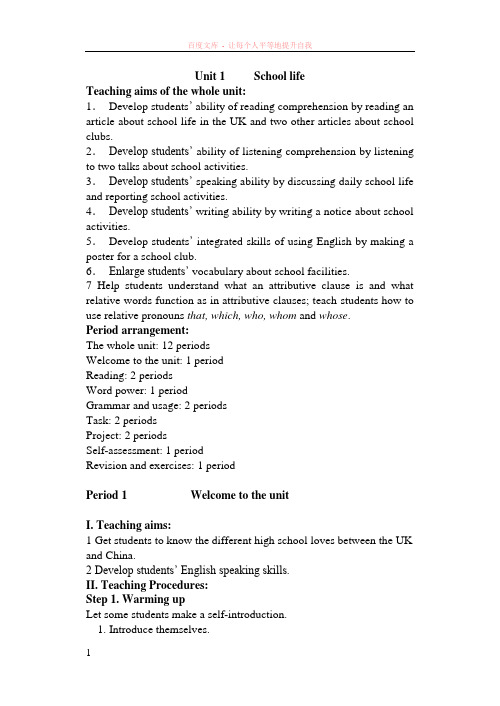
Unit 1 School lifeTeaching aims of the whole unit:1.Develop students’ ability of reading comprehension by reading an article about school life in the UK and two other articles about school clubs.2.Develop students’ ability of listening comprehension by listening to two talks about school activities.3.Develop students’ speaking ability by discussing daily school life and reporting school activities.4.Develop students’ writing ability by writing a notice about school activities.5.Develop students’ integrated skills of using English by making a poster for a school club.6.Enlarge students’ vocabulary about school facilities.7 Help students understand what an attributive clause is and what relative words function as in attributive clauses; teach students how to use relative pronouns that, which, who, whom and whose.Period arrangement:The whole unit: 12 periodsWelcome to the unit: 1 periodReading: 2 periodsWord power: 1 periodGrammar and usage: 2 periodsTask: 2 periodsProject: 2 periodsSelf-assessment: 1 periodRevision and exercises: 1 periodPeriod 1 Welcome to the unitI. Teaching aims:1 Get students to know the different high school loves between the UK and China.2 Develop students’ English speaking skills.II. Teaching Procedures:Step 1. Warming upLet some students make a self-introduction.1. Introduce themselves.2. Say something about their junior high school life.3. Pair work: brain storm:When we are talking about our school life, what will we probably think of?What words or phrases will we use to describe our school life? Step 2 Presentation1.Say the following to students:It’s the beginni ng of the new term. You’ve just finished your junior high and are about to enter a new period in your studies. I am happy to give your lessons and I hope we can be friends.I can see that some of your are eager to know what studying at senior high will be like. Will it be differ4ent from junior high? Well, there are certainly many differences between junior high and senior high, but there are also some things that are the same in every school in China. What about schools in other countries? Do you have different experiences? Are schools all over the world the same? This is the subject of our first unit.2. Ask students to read the instruction and tell them:Here are three pictures that show some aspects of school life in the UK. Please read the instructions, look at the pictures: what's the difference between schools in China and the UK?Step 3 Discussion1 Ask students the following questions to talk about the words in the four pictures:Huge campus and low-rise buildingsWhat does huge mean?What does low-rise mean?What about campus and school buildings in China?(Schools in China usually have a large enough campus to make sure students have enough space to study and play. But most school buildings have at least 3 storeys.)Lockers for every studentDo you know what a locker is?(There are rows of lockers by the classrooms for students to put their bookd, exercise-books and other belongings.)What do you think about locker for students?Do you think that we should have such locker in our school? Why or Why not?Fewer students in each classHow many students are there in our class?Do you know the number of students in a class in the UK?At ease with our teacherWhat can we know from this picture?What does the word ease mean? What do you think the phrase at ease mean?Were you getting on well with the teacher when you were in junior high?What relationship do you want to have with your teachers in senior high?2 Ask students to work in groups to talk about the four pictures and the differences between schools in the UK and China. Then ask several students to report their discussion to the whole class.aspects In the UK In ChinaHuge campus and low-rise buildings We can see hugecampus andlow-rise buildings.It is the biggestdifference fromschools in ChinaSchools in China usually have alarge enough campus to make surestudents have enough space tostudy and play in.But most school buildings aretaller, at least three storeys.Lockers for every student There are rows oflockers by theclassrooms forstudents to put theirstationary, books,exercise-books andother belongings.Students bring what they need forlessons to school and then take itall back home after school. Mostschools in china do not haveequipment in the classroom.Fewer students in each class There are fewerstudents in a class,no more than 30 perclass.There are usually more students inhigh school, perhaps 40 to 50 perclass. Recently some schools arebeginning to limit the number ofstudents in each class.At ease with Students have a It is similar in china. Nowadays,our teacher close relationshipwith their teachers.They feel at easeand comfortablewith them. lots of teachers and students have established a good relationship with each other. They respect each other and work to gain a better understanding of each other.3. Ask students to discuss the three questions in pairs, and them ask some of them to report their answers to the questions to the whole class.What is your dream school life like?What kind of school activities do you enjoy?What do you think of your life here in the new school?Step 4 Summary and HomeworkTo day we’ve mainly talked about the differences between the high school lives in the UK and in China. After class you should:1) Recall all the new words and expressions that we learn in this lesson.2) Find more about any other differences between the high school lives in the UK and in China, either by surf the Internet or by reading some articles in newspapers or magazines.3) Preview the following part: reading (page 2 to page 4).Period 2 Reading (1) School life in the UKTeaching aims:1. Get students to know what school life is like in a high school in the UK.2. D evelop students’ ability of reading comprehension through:1)skimming and scanning.2)Guessing the meanings of some new words from the context3. To learn some expressions about school life.Teaching procedures:Step 1 Lead-in and PresentationSay the following to the students:Yesterday we’ve talked about the differences between the high school lives in the UK and in China. We know well about the high school lives in China, because we are Chinese. But we know a little about the highschool lives in the UK. Yeah? Today we are going to read a magazine article which is written by an exchanging student. She has been studying in the UK for one year. Now she gives a clear brief introduction about her school life there.(Bb: School life in the UK) Before we read the article, we are going to learn the reading strategy: skimming and scanning.Please look at page 3: Reading strategy. (Bb the following while learning the reading strategy. ) Skimming: to get a general idea of the article, without studying it in detail.Focus on the titles, headings, the first and last sentences or paragraphs, charts and pictures …scanning: to find certain information in an article quickly.Look for key words and phrases, dates and numbers, etc.Step 2. Reading1. Skimming:Question: How does Wei Hua feel about her life in the UK?2. Scanning:1)Ask students to go through the three questions in part A and makesure that each of them know the meaning of each question.(AWoodwork class is a class in which students make somethingfrom wood.)Ask students to read the passage as quickly as possible and try to find answers to the three questions. Remind students only tofocus on and identify the most important information.2)Ask student to reread the passage and complete Part C1individually. Then ask some of them to give the answers to thequestions in Part C13)Ask students to finish Part C2 individually. Then get somestudents to share their answers with the whole class. Ask them to say the true sentences to correct the false ones.3 GuessingAsk students to finish Part D individually. Tell them not to look up the meanings of the words from the wordlists in the textbook. Let them guess the meanings from the context. Then check the answers with the whole class.Step 3 New Words in this UnitStudy the new words appears from page2 to page 5 (from attend to immediately) at page 68.Step 4. Homework.1. Complete part E on page 5.2. Read the two articles in reading on pages 82 and 83 in wb and answers the questions below them.3. Learn all the new words we learned today by heart.Period 3 Reading (2) School life in the UKTeaching aims:1 Help students become more familiar with the article.2 Develop s tudents’ ability of reading comprehension by finding out what topics are covered in the article.3 Develop students’ ability of speaking by discussing the subjects they like in school.Teaching Procedures:Step 1. Revision:Check the homework:1)Have a dictation to go over the words learned last period.2)Check the answers in reading on pages 82 and 83 in wb.3)Ask some students to read the article in Part E to check whetherthey have used the suitable word in each blank.Step 2 Reading1) Ask some students to read the article aloud paragraph by paragraph. Ask other students to find out what topics are covered in it.School hoursSchool assemblyTeachersClass sizeDifferent classes in different classroomsHomeworkSubjects and favourite subjectsWhat to do at lunchtimeBritish food3)Ask students to point out the different high school lives in the UKand in China in these topics.Step 3 DiscussionLet students look at Part F together and discuss the questions in Part F in Pairs. Then get some pairs to act out their discussion in class.Step 4 Language focus1 Ask students to find out the following words, phrases and sentences in the article. Then give some explanations.Words:a)as (since, because, for)b)attend (join, join in, take part in)c)prepared)experiencee)respectf)exciting, excitedg)dropPhrases:a)for freeb)be happy withc)used to do sth.; be/get used to do sth.; be/get used to doing sth.d)the way to do; the way of doing; the way + Attributive Clausee)at the end of; in the end; by the end off)as … asSentences:a)Going to a British school for one year has been a very enjoyableand exciting experience for me.b)I do like eating.c)We also had different students in some class, so it was difficult toremember all the faces and names.2 Ask students to put the following sentences into English in their exercise-books.1) Jim 加入了我们的讨论之列。
牛津译林版英语高一上册Module1《Unit1Schoollife》word教案
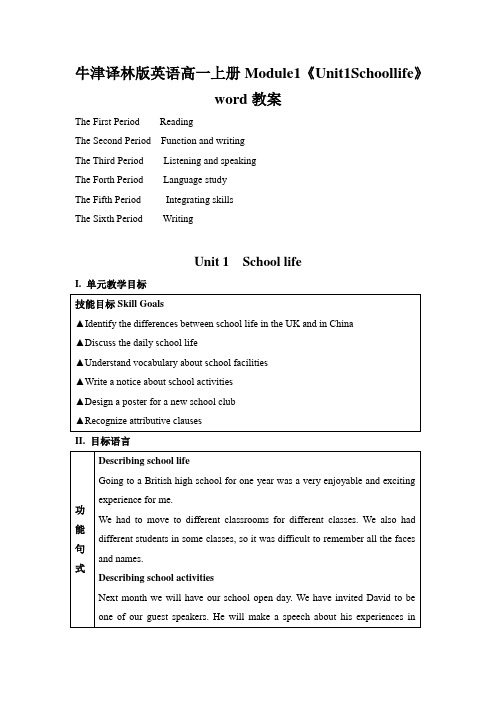
牛津译林版英语高一上册Module1《Unit1Schoollife》word教案The First Period ReadingThe Second Period Function and writingThe Third Period Listening and speakingThe Forth Period Language studyThe Fifth Period Integrating skillsThe Sixth Period WritingUnit 1 School lifeI. 单元教学目标II. 目标语言Ⅲ. 教材分析与教材重组1. 教材分析本单元以School life为话题,旨在通过单元教学使学生了解英国校园生活的一些差不多情形及中英两国校园生活的不同之处;学习并能运用表示校园设施的一些差不多词汇;学习定语从句的差不多概念及关系代词的用法;能就校园活动的话题展开讨论;能就校园活动情形向班任老师做出报告;学习通知的写法;学会设计以介绍学校俱乐部为主题的海报等。
1.1 Welcome to the unit 部分利用四幅图片,分别从(校园风貌、生活设施、课堂教学、师生关系)四个不同的侧面介绍了英国校园生活的有关情形。
该部分还设计了三个讨论话题,引导学生对中英两国校园生活进行比较,并就相关话题发表自己的看法。
1.2 Reading部分的短文节选自一份校园杂志。
文章由一位交换留学生所写。
作者通过自己的亲身经历简要地介绍了英国学校生活的一些情形。
文章前后分别设计了五个部分的练习:前两个练习(A、B)要求学生运用本单元介绍的两种差不多阅读方法(skimming and scanning)阅读文章,把握文章主旨大意,了解文中明显的细节内容;练习C1通过问题的形式考查学生对文中具体信息的把握程度;C2通过判定正误练习加深学生对阅读材料的明白得;D部分为词汇练习,要求学生第一联系上下文推测所给词汇的含义;然后通过配对练习关心学生把握新词的含义和用法;E部分要求学生通过运用所给词汇填空的方式完成一封英国学生写给Wei Hua的信件,以进一步加深学生对阅读内容的明白得;练习F设计了两个话题,引导学生对校园生活有关话题展开讨论,以获得对文章深层次的明白得。
新牛津译林版高中英语必修一unit 1《school life》school life in the uk优秀教案(重点资料).doc
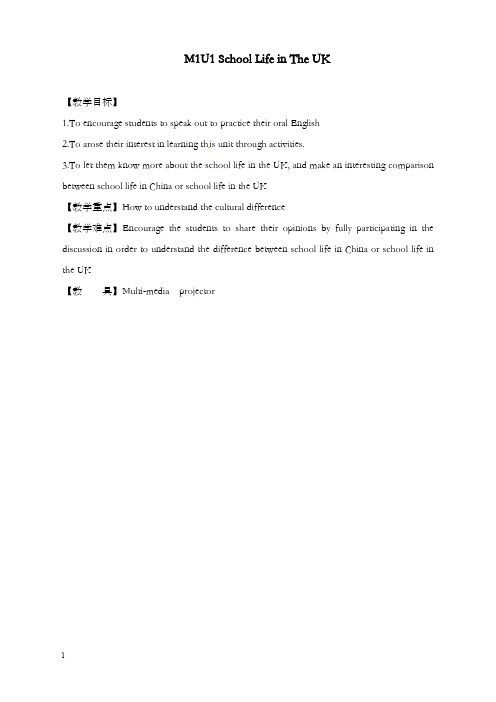
本句里的Going是动名词,它和后面的to a British high school for one year构成动名词短语作句子的主语。Go to a British high school本来是个动词词组,在go后面加上ing后,它就具备名词的特性可以在句子中充当主语、宾语或表语。
Find out the main idea of each paragraph and answer questions concerning the content of each paragraph.
Part1:
School hours:
1. Was she happy with the school hours? ______________
My(7)_______ teacher taught us English Literature.
Homework was not as (8)_______as what I used to get in my
old school.
My English (9)______a lot as I used English everyday and
be happy with对……很满意,相当于be pleased with
I'm pleased with his new house.
▲拓展:be happy to do sth乐于做某事
I shall be happy to accept your invitation.
3.This means I could get up a n hour later than usual as schools in China begin before 8 a.m.
高一牛津英语模块一Unit 1 School life 教案 共十二课时 译林牛津版必修1 教案
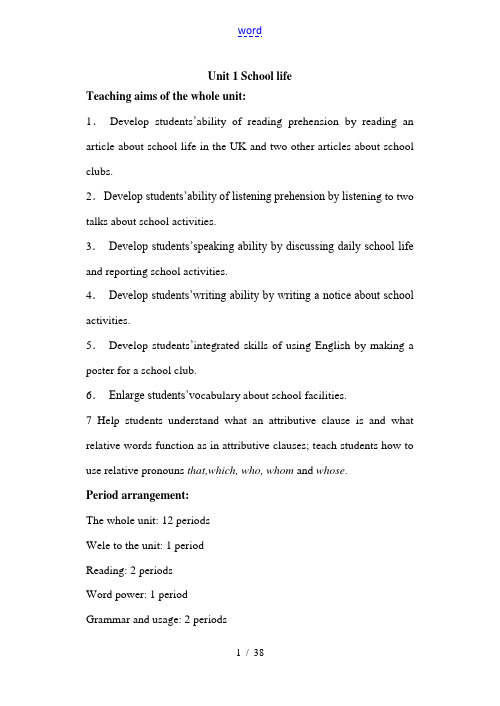
Unit 1 School lifeTeaching aims of the whole unit:1.Develop students’ability of reading prehension by reading an article about school life in the UK and two other articles about school clubs.2.Develop students’ability of listening prehension by listen ing to two talks about school activities.3.Develop students’speaking ability by discussing daily school life and reporting school activities.4.Develop students’writing ability by writing a notice about school activities.5.Develop students’integrated skills of using English by making a poster for a school club.6.Enlarge students’vo cabulary about school facilities.7 Help students understand what an attributive clause is and what relative words function as in attributive clauses; teach students how to use relative pronouns that,which, who, whom and whose.Period arrangement:The whole unit: 12 periodsWele to the unit: 1 periodReading: 2 periodsWord power: 1 periodGrammar and usage: 2 periodsTask: 2 periodsProject: 2 periodsSelf-assessment: 1 periodRevision and exercises: 1 periodPeriod 1 Wele to the unitI. Teaching aims:1 Get students to know the different high school loves between the UK and China.2 Develop students’ English speaking skills.II. Teaching Procedures:Step 1. Warming upLet some students make a self-introduction.1. Introduce themselves.2. Say something about their junior high school life.3. Pair work: brain storm:When we are talking about our school life, what will we probably think of?What words or phrases will we use to describe our school life? Step 2 Presentation1.Say the following to students:It’s the beginni ngof the new term. You’ve just finished your junior high and are about to enter a new period in your studies. I am happy to give your lessons and I hope we can be friends.I can see that some of your are eager to know what studying at senior high will be like. Will it be differ4ent from junior high? Well, there are certainly many differences between junior high and senior high, but there are also some things that are the same in every school in China.What about schools in other countries? Do youhave different experiences? Are schools all over the world the same? This is the subject of our first unit.2. Ask students to read the instruction and tell them:Here are three pictures that show some aspects of school life in the UK. Please read the instructions, look at the pictures: what's the difference between schools in China and the UK?Step 3 Discussion1 Ask students the following questions to talk about the words in the four pictures:Huge campus and low-rise buildingsWhat does huge mean?What does low-rise mean?What about campus and school buildings in China?(Schools in China usually have a large enough campus to make sure students have enough space to study and play. But most school buildings have at least 3 storeys.)Lockers for every studentDo you know what a locker is?(There are rows of lockers by the classrooms for students to put their bookd, exercise-books and other belongings.)What do you think about locker for students?Do you think that we should have such locker in our school? Why or Why not?Fewer students in each classHow many students are there in our class?Do you know the number of students in a class in the UK?At ease with our teacherWhat can we know from this picture?What does the word ease mean? What do you think the phrase at ease mean?Were you getting on well with the teacher when you were in junior high?What relationship do you want to have with your teachers in senior high?2 Ask students to work in groups to talk about the four pictures and the differences between schools in the UK and China. Then ask several students to report their discussion to the whole class.3. Ask students to discuss the three questions in pairs, and them ask some of them to report their answers to the questions to the whole class.What is your dream school life like?What kind of school activities do you enjoy?What do you think of your life here in the new school?Step 4Summary and HomeworkToday we’ve mainly talked about the differences between the high school lives in the UK and in China. After class you should:1) Recall all the new words and expressions that we learn in this lesson.2) Find more about any other differences between the high school lives in the UK and in China, either by surf the Internet or by reading some articles in newspapers or magazines.3) Preview the following part: reading (page 2 to page 4).Period 2 Reading (1) School life in the UKTeaching aims:1. Get students to know what school life is like in a high school in the UK.2. D evelop students’ ability of reading prehension through:1)skimming and scanning.2)Guessing the meanings of some new words from the context3. To learn some expressions about school life.Teaching procedures:Step 1 Lead-in and PresentationSay the following to the students:Yesterday we’ve talked about the differences between the high school lives in the UK and in China. We know well about the high school lives in China, because we are Chinese. But we know a little about the high school lives in the UK.Yeah? Today we are going to read a magazine article which is written by an exchanging student. She has been studying in the UK for one year. Now she gives a clear brief introduction about her school life there.(Bb: School life in the UK)Before we read the article, we are going to learn the reading strategy: skimming and scanning.Please look at page 3: Reading strategy. (Bb the following while learning the reading strategy. )Skimming: to get a general idea of the article, without studying it in detail.Focus on the titles, headings, the first and last sentences or paragraphs, charts and pictures …scanning: to find certain information in an article quickly.Look for key words and phrases, dates and numbers, etc.Step 2. Reading1. Skimming:Question: How does Wei Hua feel about her life in the UK?2. Scanning:1)Ask students to go through the three questions in part A and makesure that each of them know the meaning of each question.(AWoodwork class is a class in which students make somethingfrom wood.)Ask students to read the passage as quickly as possible and try to find answers to the three questions. Remind students only tofocus on and identify the most important information.2)Ask student to reread the passage and plete Part C1 individually.Then ask some of them to give the answers to the questions inPart C13)Ask students to finish Part C2 individually. Then get somestudents to share their answers with the whole class. Ask them to say the true sentences to correct the false ones.3 GuessingAsk students to finish Part D individually. Tell them not to look up the meanings of the words from the wordlists in the textbook. Let them guess the meanings from the context. Then check the answers with the whole class.Step 3 New Words in this UnitStudy the new words appears from page2 to page 5 (from attend to immediately) at page 68.Step 4. Homework.1. plete part E on page 5.2. Read the two articles in reading on pages 82 and 83 in wb and answers the questions below them.3. Learn all the new words we learned today by heart.Period 3 Reading (2) School life in the UKTeaching aims:1 Help students bee more familiar with the article.2 Develop students’ability of reading pr ehension by finding out what topics are covered in the article.3 Develop students’ability of speaking by discussing the subjects they like in school.Teaching Procedures:Step 1. Revision:Check the homework:1)Have a dictation to go over the words learned last period.2)Check the answers in reading on pages 82 and 83 in wb.3)Ask some students to read the article in Part E to check whetherthey have used the suitable word in each blank.Step 2 Reading1) Ask some students to read the article aloud paragraph by paragraph. Ask other students to find out what topics are covered in it.School hoursSchool assemblyTeachersClass sizeDifferent classes in different classroomsHomeworkSubjects and favourite subjectsWhat to do at lunchtimeBritish food3)Ask students to point out the different high school lives in the UKand in China in these topics.Step 3 DiscussionLet students look at Part F together and discuss the questions in Part F in Pairs. Then get some pairs to act out their discussion in class.Step 4 Language focus1 Ask students to find out the following words, phrases and sentences in the article. Then give some explanations.Words:a)as (since, because, for)b)attend (join, join in, take part in)c)prepared)experiencee)respectf)exciting,excitedg)dropPhrases:a)for freeb)be happy withc)used to do sth.;be/get used to do sth.;be/get used to doing sth.d)the way to do; the way of doing; the way + Attributive Clausee)at the end of;in the end; by the end off)as … asSentences:a)Going to a British school for one year has been a very enjoyableand exciting experience for me.b)I do like eating.c)We also had different students in some class, so it was difficult toremember all the faces and names.2 Ask students to put the following sentences into English in their exercise-books.1) Jim 加入了我们的讨论之列。
【教学】牛津译林版英语高一上册Module1Unit1Schoollifeword教案
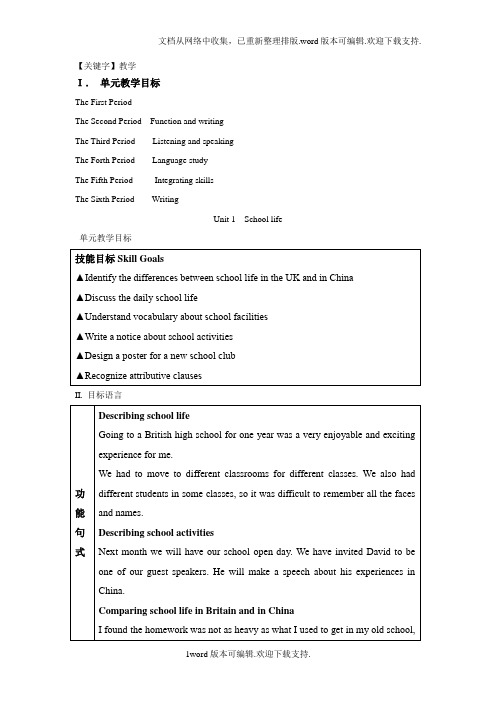
【关键字】教学I.单元教学目标The First PeriodThe Second Period Function and writingThe Third Period Listening and speakingThe Forth Period Language studyThe Fifth Period Integrating skillsThe Sixth Period WritingUnit 1 School life 单元教学目标II. 目标语言Ⅲ. 教材分析与教材重组1. 教材分析本单元以School life为话题,旨在通过单元教学使学生了解英国校园生活的一些基本情况及中英两国校园生活的不同之处;学习并能运用表示校园设施的一些基本词汇;学习定语从句的基本概念及关系代词的用法;能就校园活动的话题展开讨论;能就校园活动情况向班任老师做出报告;学习通知的写法;学会设计以介绍学校俱乐部为主题的海报等。
1.1 Welcome to the unit 部分利用四幅图片,分别从(校园风貌、生活设施、课堂教学、师生关系)四个不同的侧面介绍了英国校园生活的有关情况。
该部分还设计了三个讨论话题,引导学生对中英两国校园生活进行比较,并就相关话题发表自己的看法。
1.2 Reading部分的短文节选自一份校园杂志。
文章由一位交换留学生所写。
作者通过自己的亲身经历简要地介绍了英国学校生活的一些情况。
文章前后分别设计了五个部分的练习:前两个练习(A、B)要求学生运用本单元介绍的两种基本阅读方法(skimming and scanning)阅读文章,把握文章主旨大意,了解文中明显的细节内容;练习C1通过问题的形式考查学生对文中具体信息的把握程度;C2通过判断正误练习加深学生对阅读材料的理解;D部分为词汇练习,要求学生首先联系上下文猜测所给词汇的含义;然后通过配对练习帮助学生掌握新词的含义和用法;E部分要求学生通过运用所给词汇填空的方式完成一封英国学生写给Wei Hua的信件,以进一步加深学生对阅读内容的理解;练习F设计了两个话题,引导学生对校园生活有关话题展开讨论,以获得对文章深层次的理解。
